On a spring afternoon, the dry bulk carrier Macondo took on a load of rice at the Lake Charles, La., docks. While the ship was at berth, Capt. Gustavo Torres and some of his crew relaxed by playing air hockey and phoning their families back in Colombia.
The men were able to catch a break ashore as a result of the work of the port's Stella Maris Lake Charles Seafarers' Center. The center, a project of the local Roman Catholic diocese, provides visiting mariners with a much-needed respite from their regular grind.
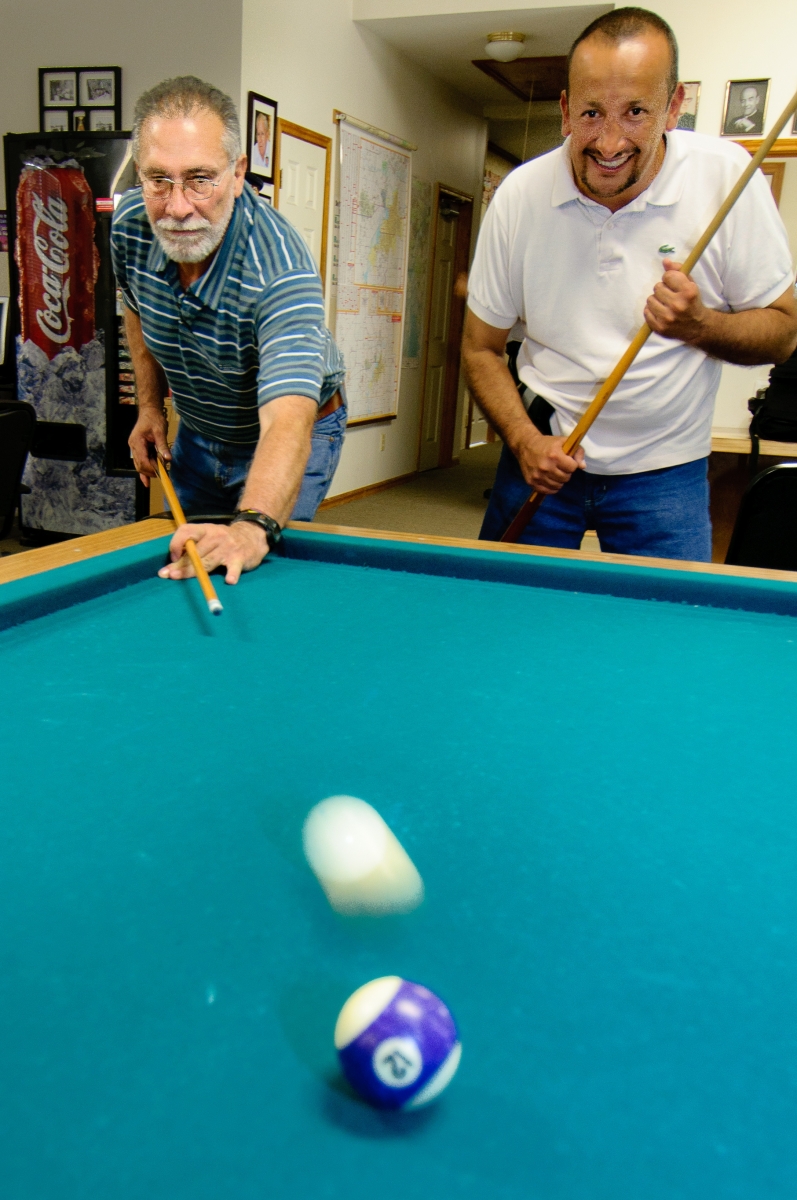 |
|
Capt. Gustavo Torres and 2nd Mate Jorge Xlieto enjoy a game of billiards in the recreation room at the Stella Maris Lake Charles Seafarers' Center while their dry-bulk carrier Macondo is taking on a cargo of rice at the docks. (Brian Gauvin photo) |
The facility offers a recreation room, computers, phone cards and van rides to buy grub. The experience allows the weary seafarers to feel grass under their feet, relieve boredom, have some fun and contact their loved ones.
"Sailors around the world are very, very grateful for the services of Stella Maris," Torres said. "You're like a prisoner when you're inside a ship. If you come from five days on the sea and you have no facilities and nothing to do and you have to wait inside the ship and then go back to sea for another five days, it's not so good for a person's mind."
Stella Maris is Latin for "star of the sea." The Lake Charles center serves in the tradition of the papal Apostleship of the Sea (AOS), the official international Catholic ministry to people on the water. About 60 port ministries in North America operate as Stella Maris or as AOS centers, which are not formally connected to a diocese.
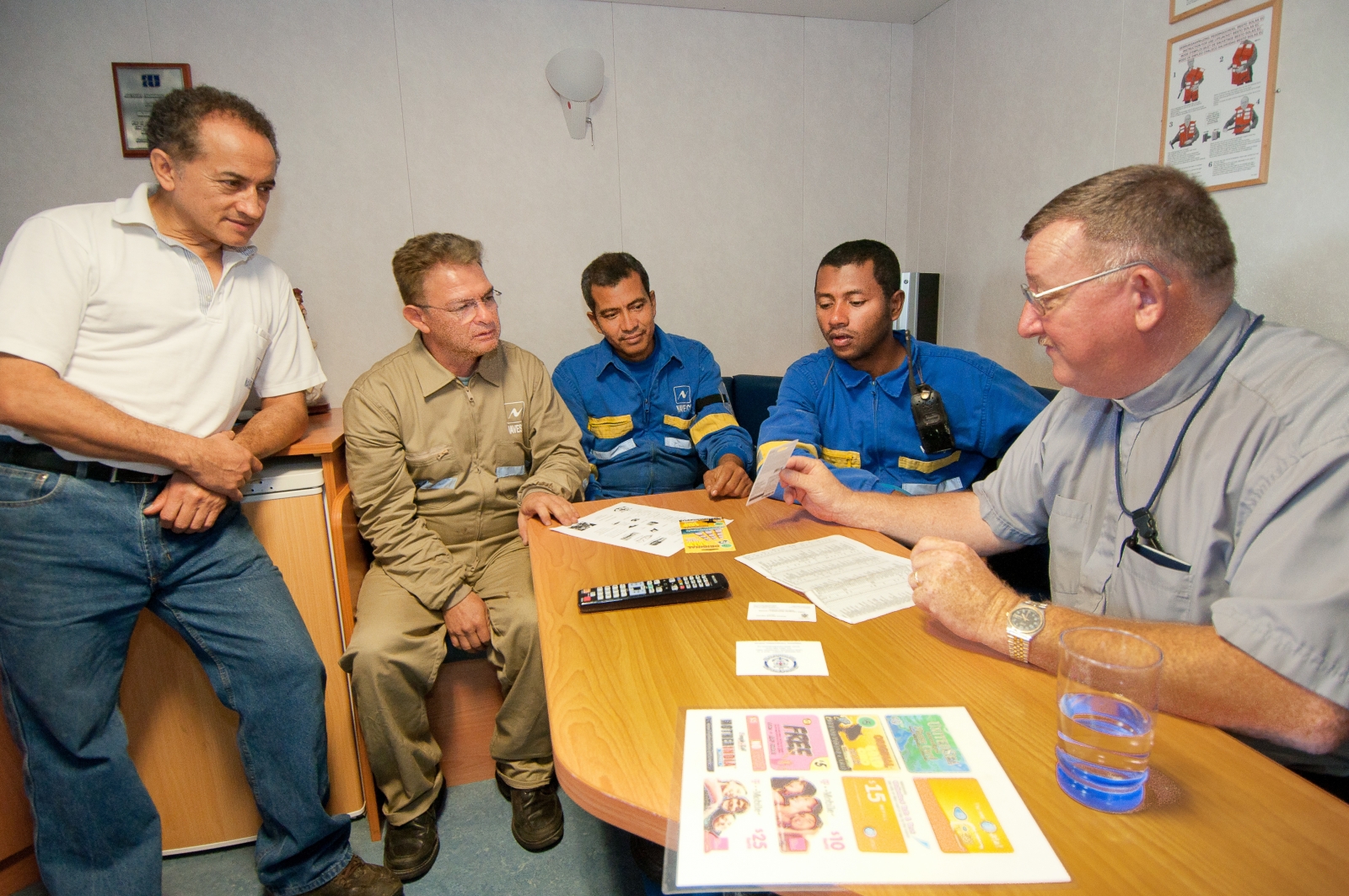 |
|
Deacon Patrick Lapoint, far right, gives shore-leave advice and passes out coupons to crewmembers in the Colombia-flagged ship's galley. (Brian Gauvin photo) |
The Lake Charles organization operates with the help of diocesan funding and revenue from the sale of phone cards. The facility is in the Lake Charles port area, but is outside the security perimeter. The director, Deacon Patrick Lapoint, holds a Transportation Worker Identification Credential. He enters the port and picks up the mariners in the center's van. Foreign seafarers need a D-1 visa to go ashore.
Once at the Stella Maris center, the ship crews can play air hockey, table tennis and billiards. There is a library with books and magazines. Coffee and cookies are served. A priest celebrates Catholic Mass every Thursday.
For seafarers who lack the necessary visa to go ashore, Lapoint boards the ship to visit them and provide friendly conversation or, if requested, spiritual support.
While the games and snacks are popular, Lapoint said, mariners are most grateful for the ability to phone or e-mail loved ones. Phone and computer banks are set up to facilitate that.
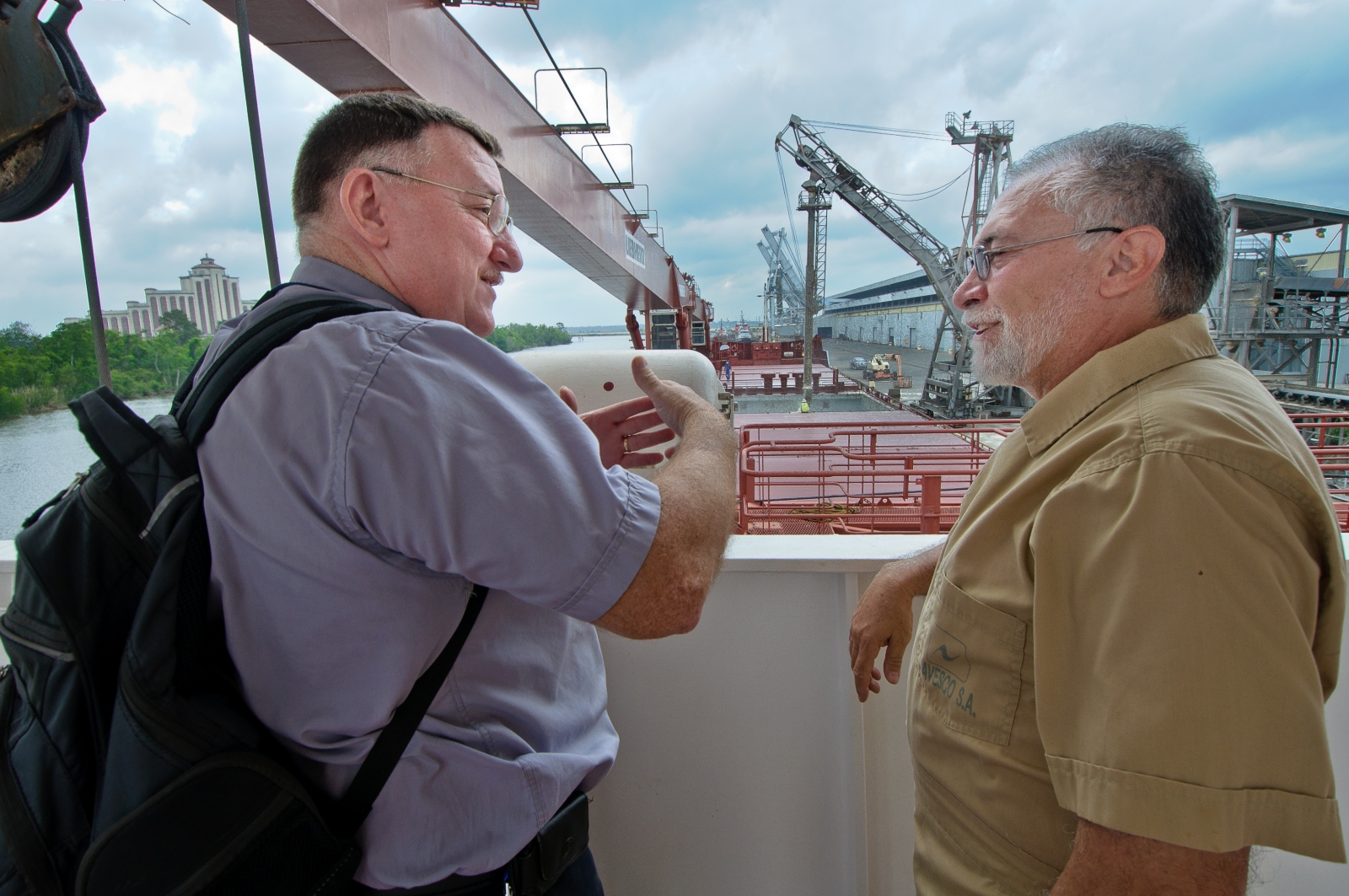 |
|
Deacon Patrick Lapoint, left, director of the Lake Charles Seafarers' Center, confers with Capt. Gustavo Torres aboard Macondo. Torres says his crew relies on Stella Maris centers in various ports to unwind after a long voyage and to phone family members back home. (Brian Gauvin photo) |
"It's contact with family that is most important," Lapoint said. "They will spend their last $5 on a phone card just to call their family, and the free WiFi makes it so much easier."
The Stella Maris centers are the Catholics' contribution to the long tradition of ecclesiastical mission work on the waterfront. Anglican and Scandinavian Lutheran churches were the first to provide aid and worship opportunities directly to visiting seafarers as early as the 1820s. At that time, the religious organizations and the community were eager to provide seamen with an alternative to brothels and saloons.
Today church-related groups operate about 200 seafarer centers and port chaplaincies in the United States and Canada, according to the North American Maritime Ministry Association (NAMMA).
No two centers are exactly alike, said NAMMA's executive secretary, Chaplain Lloyd Burghart. Most of the organizations are operated by Catholic, Episcopal, Lutheran, Presbyterian or Southern Baptist clergy and volunteers. In addition to providing port chaplains, some assist with advocacy and mariner training.
Seamen's Church Institute of New York and New Jersey, which is closely tied to the Episcopal Church, has major operations in Port Newark, N.J., and Oakland, Calif., among others, and runs an inland-navigation simulation center in Paducah, Ky. The Seamen's Church Institute of Philadelphia and South Jersey is totally separate and multi-denominational. The Houston International Seafarers' Center and United Port Ministries of Seattle are other examples of multi-denominational organizations.
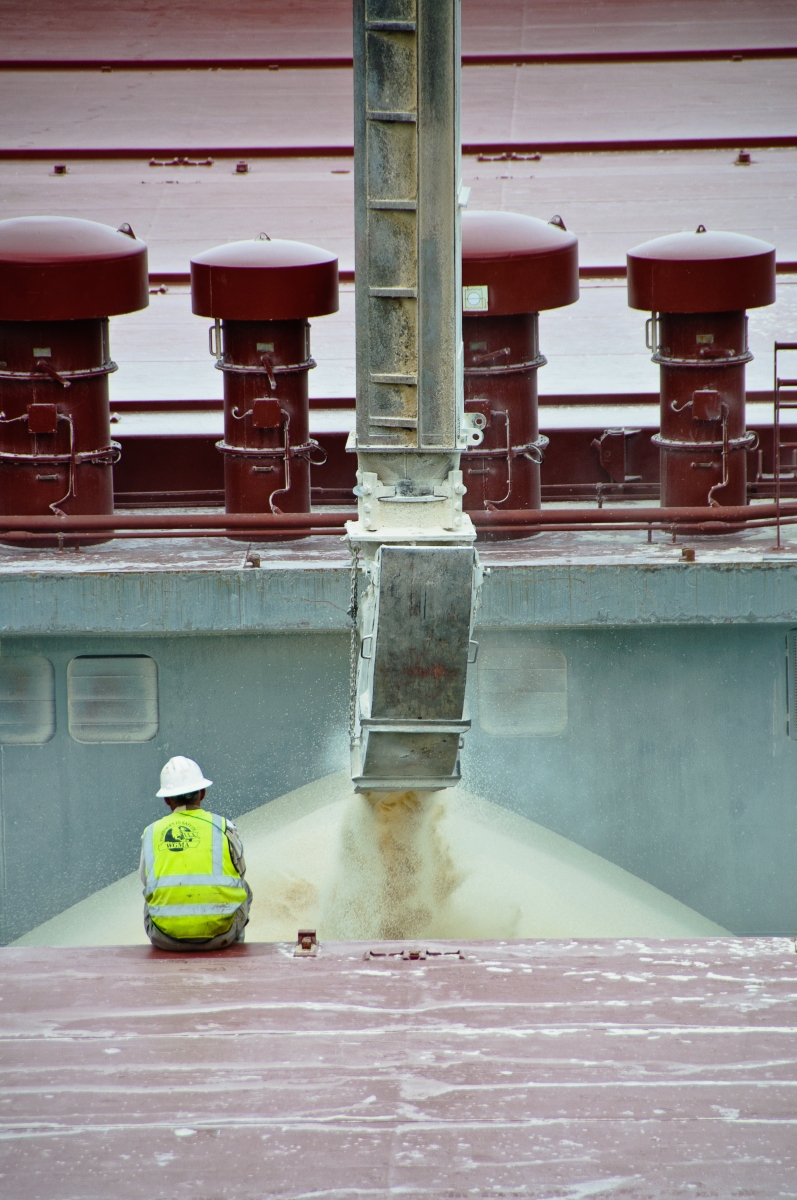 |
|
A solitary crewman keeps watch as the dry-bulk carrier Macondo is loaded with a cargo of rice at Lake Charles, La. Life at sea can be lonely and monotonous, and ship crews look forward to relaxing ashore when they can. (Brian Gauvin photo) |
Two maritime ministries run hotels — Seafarers & International House, a Lutheran institution in New York, and Mariners House in Boston. AOS of the United States of America organizes a corps of Catholic priests who serve aboard cruise ships.
While maritime labor practices and technology have changed, the port chaplains still fill a critical role in providing humanitarian aid to ship crews who sometimes face loneliness, cruelty and exploitation, Burghart said.
"Seafarers are the neglected people of this world," Burghart said. "Most Americans don't realize that 90 percent of what they use and wear is delivered by ship. They think it's all delivered by truck."
At Stella Maris in Lake Charles, the guest book is full of thank-you messages left by mariners hailing from all over the world. "Always love to be here," said one crewman from Liberia. "Muy bueno, very good!" wrote another from Colombia. "Very good — God bless" was the greeting from a Filipino.
The center's rooms are decorated with gifts from the visitors. They include wood carvings, souvenirs from ships and paper currency from their homelands that is faithfully collected on Lapoint's "Money Wall."
Domestic mariners use the Seafarers' Center too. Oceangoing tugboats frequently stop at Lake Charles, for example. The recreation room wall is decorated with old life rings from the U.S.-flagged cargo ships Maersk Texas, Maersk Tennessee and Maersk Constellation.
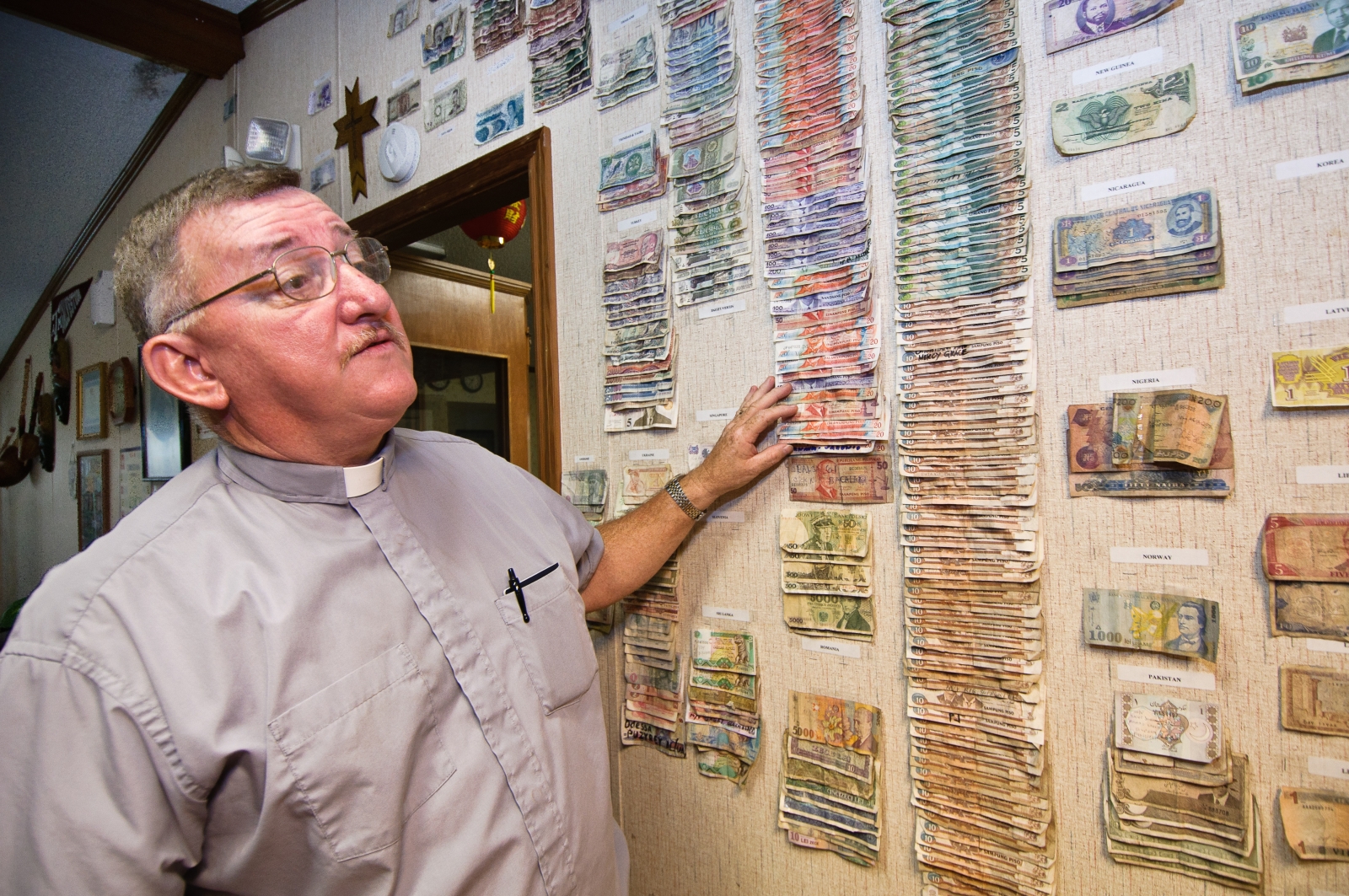 |
|
Deacon Patrick Lapoint admires the "Money Wall" in the Lake Charles Seafarers' Center. Mariners from all over the world offer souvenirs of their homelands' paper currency as a token of their appreciation for the center's services. (Brian Gauvin photo) |
Back on the 389-foot Macondo, while machines slowly loaded 7,350 metric tons of rice destined for Haiti, officers prepared to welcome Lapoint aboard. Several crew gathered in the galley, where they greeted Lapoint and picked out phone cards. The captain said some terminals intentionally make it difficult for his crew to disembark, or they overcharge the mariners for escorted rides to the facility exit.
"If you don'™t know where to go for a phone or how to get a taxi, it's difficult for us. Sometimes you have a sick person at home, and you need to know how they are. It's very important. Stella Maris gives us one of the best facilities for that," said Capt. Torres. "Normally when we come in from the sea, it's necessary to have some recreation. The ship is very small and you have no place to play any games."
Although the Catholic diocese funds it, the Lake Charles center also works with a Baptist minister who offers a worship service in the building. The International Transport Workers' Federation awarded the center a grant, which helped to pay for the recreation room.
"We're also advocates if a ship is having a problem, like the crew not being paid," Lapoint said.
Since 2001, his center has successfully assisted 17 ship crews who hadn't been paid. Those recovered wages totaled about $700,000.
For the crew of the Colombia-flagged Macondo, it's enough just to hang out and play some games.
"You can go there to clear your mind," Torres said.
